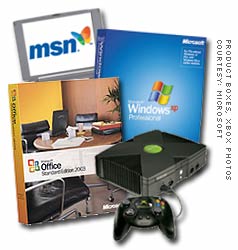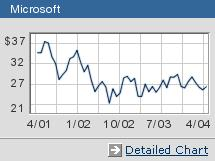NEW YORK (CNN/Money) -
Welcome to the tech stock rally, Microsoft. What took you so long?
Shares of Microsoft (MSFT: up $1.50 to $27.47, Research, Estimates), the world's largest software company, surged more than 6 percent Friday on the heels of a blowout fiscal third quarter report Thursday.
Prior to Thursday, many investors wondered whether Microsoft would ever again be considered a growth stock, as the company's core business of selling the Windows operating system and Office software for personal computers and servers was starting to slow.
 |
|
| Strong sales growth in all of Microsoft's divisions boosted the company's 3Q results. |
But the strong quarter has allayed some of these fears. Microsoft reported better than expected year-over-year sales growth of 17 percent, evidence that the company was benefiting from what appears to be a strong pickup in corporate demand for PCs and servers.
"The economy has been growing and that's been a benefit for Microsoft," said Alan Loewenstein, co-manager of the John Hancock Technology fund, which owns Microsoft. "That's going to be a positive not only for this quarter but throughout the rest of the year."
Microsoft's sales growth was strong across all of its business units, including smaller divisions like its online unit MSN, which benefited from a surge in online advertising, and its home and entertainment business, which includes Microsoft's Xbox gaming console and software.
Growth stock? Not so fast.
Still, it might be a stretch to say that Microsoft is once again a true "growth" company.
For its next fiscal year, which ends in June 2005, Microsoft said sales should be in a range of $37.8 billion to $38.2 billion. The $38 billion midpoint of that range is below analysts' consensus estimates of $38.5 billion and represents just 4 percent annual growth.
"There are certainly some solid growth prospects for Microsoft but it's not going to be the glory days again," said Alan Davis, an analyst with McAdams Wright Ragen.
So why were investors so excited? For one thing, Microsoft has historically been incredibly conservative with its guidance. Loewenstein said he sees no reason, barring an economic slowdown, why Microsoft would not top its sales forecast.

| |
|
Microsoft's stock hasn't crossed the $30 level in more than two years.
|
|
After all, Microsoft told investors in January that it expected fiscal third quarter sales to come in between $8.6 billion and $8.7 billion. The company reported $9.2 billion.
But what seemed to really excite investors was the company's earnings guidance. Excluding the cost of Microsoft's restricted stock compensation program, the company said it expects earnings next year of between $1.31 and $1.33 a share. Analysts had been expecting just $1.28.
The fact that Microsoft's earnings guidance was higher than expected while sales guidance was lower than projected shows that Microsoft intends to keep a firm handle on operating expenses, said Brendan Barnicle, an analyst with Pacific Crest Securities.
"What's interesting is that Microsoft is now more of a leverage story," Barnicle said, meaning that with a lower cost structure, revenues will flow more quickly to the bottom line.
No longer a laggard, but not a leader
So could $30 be the next stop for Microsoft's stock? Shares have not closed above that level, on a split-adjusted basis, since March 2002. (Shares split 2-for-1 in February 2003). But thanks to the move on Friday, shares were trading at about $27.50.
| More about Microsoft
|

|
|
|
|
"This news could be enough to move the stock higher. People have been looking for reasons to buy Microsoft. It's still undervalued," said Barnicle. Shares of Microsoft trade at about 20 times the company's fiscal 2005 earnings estimate.
The potential for an increased dividend in the near future could also keep the stock on an upward path. Microsoft's cash stockpile stands at a staggering $56.4 billion and the company reiterated its promise Thursday to give investors a plan for how it intends to use much of the cash by its next analyst meeting in July.
But Microsoft still faces longer-term growth concerns, such as the increasing popularity of the open source Linux operating system, which could challenge the dominance of Windows.
In addition, despite a smaller than expected decline in Microsoft's unearned revenue, which measures the amount of sales Microsoft expects to record in coming quarters from software license renewals, in the third quarter, there are still concerns about whether large customers will feel the need to upgrade anytime soon.
Microsoft's new version of Windows, code named Longhorn, isn't due out until 2006. And the company has delayed the release of its latest version of its database management product SQL Server, dubbed Yukon, until the first half of 2005. Analysts had expected Yukon to be released this year.
With that in mind, Loewenstein thinks that Microsoft hasn't proven that it can lead future tech stock rallies. It may just stop lagging them.
"Microsoft will finally move with the market. If there's a strong market, I think Microsoft will fully participate," he said.
Pacific Crest's Barnicle owns shares of Microsoft but his firm has no banking relationship with the company. McAdams Wright Ragen's Davis does not own the stock and his firm has no banking relationship with the company.

|

